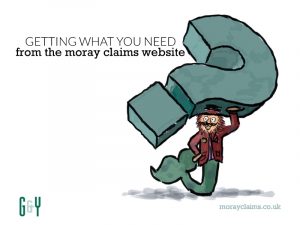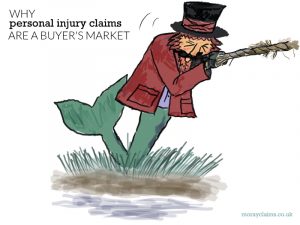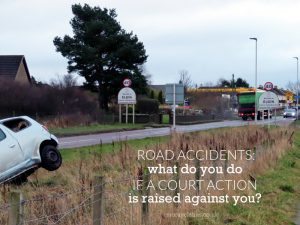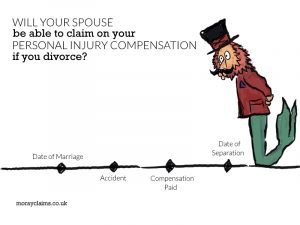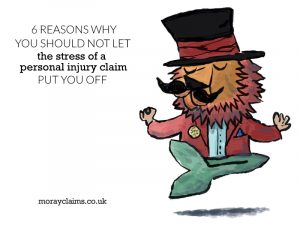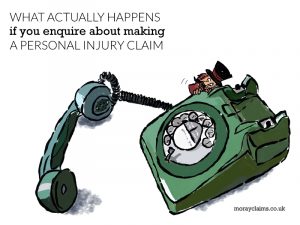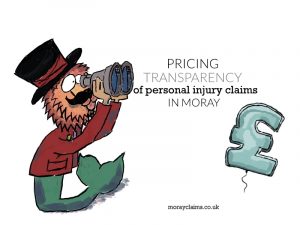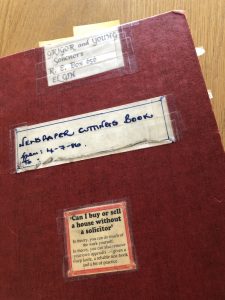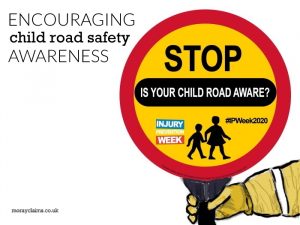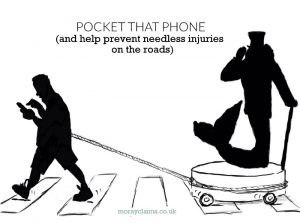UK Government guidelines advocate that their public-facing written content should meet the minimum reading age of nine years to ensure it is easily understood. Recent changes to the law on whiplash injury compensation in England and Wales (not affecting Scotland) have largely taken lawyers out of the equation for these "minor" injuries. The UK Government has provided a 64-page online guide for the injured people who will in future need to run their claims themselves, without help from a solicitor. These are what the Government has described as "simple" whiplash claims. But academic, Professor Roger Smith, has criticised the guide as "hopelessly complicated". According to what we might call the "9-year-old rule", authors of guidance material should consider, for example, adults with additional learning needs or imagine they are writing for an elderly relative. In Professor Smith's opinion, the whiplash guide “would be impenetrable to someone of that level of Continue Reading
Why Personal Injury Claims are a Buyer’s Market
Water seems a rather boring substance. Ice floats in water, as you'd expect. But is that typical behaviour for substances as between their liquid and solid forms? As you cool water down, it contracts until you get to 4°C. Then it suddenly expands again and its density reduces. So, by the time water freezes to ice, you have a material which is less dense than the liquid that it’s sitting on. There is no other known molecular material which will actually float on its melt. As a comparison, if you look at the olive oil sold in a supermarket, on a relatively cold day, at the bottom of the bottle there is an off-whitish deposit. That is olive oil ice. Olive oil is a 'normal' liquid which, when it freezes, contracts. The frozen stuff goes down to the bottom. Water brainwashes us from a young age to think that when you freeze a fluid it should become a solid which goes to the surface. But water is unique in that respect. With Personal Injury Compensation Continue Reading
Road Accidents: What To Do If A Court Action Is Raised Against You
We regularly get enquiries from people who have had a court action raised against them following involvement in a road traffic accident. If you are in that situation, what should you do? The typical scenario runs like this … You’ve had an accident with another vehicle when you were driving your car. The accident was your fault. The other vehicle was damaged or written off and the other driver was injured. Hopefully, you had comprehensive insurance and so your own vehicle will have been repaired or replaced by your insurers. They may also have told you they have settled the other party’s claim – by paying for the repair or replacement of their vehicle. Months later, out of the blue, you receive an Initial Writ or Summons (depending on whether the action against you is in the Sheriff Court or the Court of Session). This can be a startling experience, especially if the action is served on you by a Sheriff Officer or Messengers at Arms. The other driver – or maybe a passenger in that Continue Reading
Personal injury compensation and divorce
Personal injury claims come with stress attached. You have the strain of the pain and discomfort from the injury, the hassle of not being able to engage in everyday activities and possibly also the worry of loss of income through not being able to work. Coping with injury puts added pressure on your relationships. Particularly your closest relationships. This can lead to relationship breakdowns, whether that is splitting up with your boyfriend or girlfriend, or separating from your spouse or civil partner. Even the strongest relationships can be undermined. Personal injuries can be physical or mental, or both. As an injured person, you may develop depressive symptoms or changes in personality. In this article, we are going to look at what Scots law says about personal injury compensation in the context of relationship breakdown. We will focus particularly on financial provision on divorce or termination of civil partnership. We'll look at the situation Continue Reading
Difficult questions to ask your personal injury solicitor to ensure they are a perfect fit for your case
The Earth has not always experienced total solar eclipses as they are now. A solar eclipse happens when the Moon’s orbit takes it on a path directly between the Earth and the Sun. If the whole of the Sun’s disc is blocked out by the Moon, that is a total solar eclipse. The fact that the Moon can perfectly blot out the Sun – no more, no less – is an amazing coincidence. The diameter of the Moon is about 400 times less than the diameter of the Sun. The Moon is also approximately 400 times nearer to the Earth than the Sun. So, from the perspective of someone on Earth, it is possible for the Sun and the Moon to line up and for the Moon to perfectly blot out the Sun. The Moon is gradually moving away from us on Earth at about the same rate that finger nails grow. In the distant future, the Moon will be noticeably further away than it is now and so will appear smaller in the sky. It will no longer be a ‘perfect fit’ for the Sun. If you need to make a personal injury Continue Reading
6 reasons why you should not let the stress of making a personal injury claim put you off
We get stressed about money, reputation, safety, relationships, life changes… Life changes are a journey. And they’re journeys that usually involve stress. By the end, you're a different person. Both elements – change and stress – play their part in the transformation process. Personal injury claims are stressful. In this article, we’ll look at the nature and causes of the various stresses. Then, having considered these ‘problems’, we’ll list out the ‘solutions’ - the reasons why, nevertheless, you should go ahead with a personal injury compensation claim. Getting injured creates its own acute stress at the time. Often, there’s immediate severe pain. Beyond that, you have a loss of independence – with increased dependence on others. And also fears for the future: will you recover to full fitness? Most people seek legal representation for a personal injury compensation claim after the acute phase of the injury is over. Perhaps after you get out of hospital or after you Continue Reading
The most-consumed 2020 articles on the Moray Claims blog
Solicitors have generally managed to keep going through the pandemic and lockdowns in 2020. There have been good reasons to consider consulting a solicitor even though physical face-to-face meetings have been difficult, if not impossible. We’ve produced quite a few articles in 2020 and this one counts down the Top 10 most popular blog posts of the year from Moray Claims. 10. When being even 10 per cent to blame for your accident is too much to accept Contributory negligence can apply where your claim is going to be successful but there’s an argument that the accident was partly your fault too. This would have the result of reducing the compensation payable to you by a percentage. Ten per cent (the minimum level which most courts impose, in practice) may not seem too much of a reduction but this article highlights how your solicitor will often refuse to accept even 10 per cent as reasonable – and argue for nil per cent, i.e. that your claim should succeed in full, 100 per Continue Reading
What actually happens if you enquire about a personal injury claim
If you’re considering contacting us - or any solicitor - about making a personal injury claim, even if you think you might want to get in touch, lots of things can put you off at the last minute. Some doubt or some distraction may get in the way. There are many possible barriers to taking the final step and getting in touch. We want you to get in touch and not be prevented from doing so. Enquiries are free and without obligation to take things further with us. Any work that follows after we take on your personal injury claim is free of charge in most cases anyway. This article tries to provide answers to the questions that might be swirling around in your head. The questions and objections holding you back from phoning us or sending us a free online enquiry. If you’re wondering why you should get in touch with us rather than someone else who provides personal injury compensation claims services… We’re accredited specialist solicitors. We are experienced. Continue Reading
What pricing will apply to our help with your personal injury claim in Moray?
When asked about his nationality, legendary Scottish fiddler, Johnny Cunningham, liked to tell people that he was half Scottish and half Irish. This explained, he said, why half of him wanted to drink all the time and the other half never wanted to pay for it. Everyone prefers a free option if it’s realistic… …and cost is one important aspect of personal injury compensation claims. What is it that personal injury clients want? In many cases they will say that it’s about “justice”. It’s the principle of the thing. In practice, what this boils down to is questions about how much your claim is likely to be worth and how long it is all likely to take to get justice for you. From the solicitor’s point of view, the main question tends to be: “Is there a claim?” - Will we be able to prove someone caused your injury by negligence? And, of course, another important question you’ll have is: “How much is it going to cost me to get help from this solicitor? Cost Continue Reading
When being even 10 per cent to blame for your own injury is too much
“Can I buy or sell a house without a solicitor?” Grigor & Young have newspaper cuttings books back to the 19th century, and that’s how one cutting from the mid-1980s is headlined. The body text continues: “In theory, you can do much of the work yourself. In theory, you can also remove your own appendix – given a sharp knife, a reliable textbook and a bit of practice.” Seth Godin picked up on this theme of expertise in a post on his daily blog. He asked: “Okay, how hard can it be? (to be an expert). Actually, it might be very hard. Actually, expertise has value. Actually, just because someone said it on the internet doesn’t mean it’s true. Or useful.” What’s the chance you’d be able to do such conveyancing or (especially) surgery yourself? Limited, you would think. Less than 10%? Less than 1%? And a small chance is what you would expect to have, in general, if you were hoping to overturn a finding of 10% contributory negligence in a personal injury Continue Reading
Encouraging child road safety awareness
Nearly two-thirds of parents do not think their children have a good understanding of the dangers or concentrate properly near roads That’s one of the findings of a YouGov survey commissioned by the Association of Personal Injuries for Injury Prevention Week 2020. In the UK-wide study, parents of school-age children were asked to think about how confident they are about their child or children’s road safety awareness. The child road safety survey results are as follows. The remainder said their children have a very good understanding of the dangers – which is great - but we want to address the near 2/3rds of parents who are not so confident. Your biggest helper comes in the form of the Green Cross Code. Arguably, it’s as important for children to learn as spelling and multiplication. The Highway Code says that children should be taught the Green Cross Code and should not be allowed out alone until they can understand and use it properly. This is Continue Reading
Pocket that phone and help prevent needless injuries on the roads
It does not look the sort of road you would expect to see a pedestrian try to cross. Other than at traffic lights. Or using a bridge or underpass. Viewed through the dashcam of the slow-moving car in queuing traffic, we can see it’s an urban environment. The road has 4 lanes in each direction (we’re in the 3rd lane). A continuous concrete barrier about 4 feet high forms the central reservation. A young woman steps off the pavement to our left and begins crossing from left to right – for her, crossing the first half of the road. She’s on her mobile. She’s holding it up to her right ear. We can see her left hand gesturing as she chats. The field of view is distorted by the wide angle lens of the dashcam – it makes things look further away than they are in fact. As the woman crosses in front of our vehicle, she bows slightly to thank us for making room for her to pass through. The outside lane to our right has been empty throughout the 8 seconds or so since she Continue Reading
